- Home
- -Blog
Buy High-Quality Dofollow Backlinks | Ultimate Guide
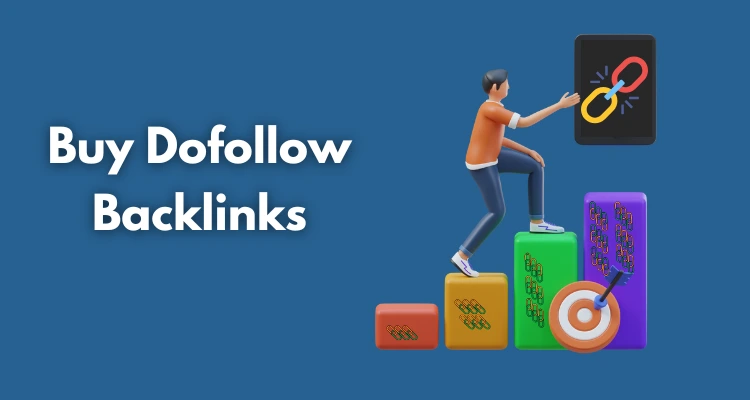
- 16 Dec 2024
- Shabir Ahmad
Dofollow backlinks are hyperlinks that pass on link equity, also known as "link juice," from one website to another. These links play a crucial role in search engine optimization (SEO) by signaling to search engines like Google that the linked site is trustworthy and authoritative.
Websites with strong dofollow backlink profiles tend to rank higher on search engine results pages (SERPs), making them highly valuable for businesses aiming to boost their online visibility.
Purchasing high-quality dofollow backlinks has become a widely adopted strategy for businesses looking to accelerate their SEO efforts. According to a survey by Moz, backlinks are one of the top three ranking factors for Google. However, acquiring these links organically can be time-intensive and challenging, which is why many businesses explore purchasing options to speed up the process.
High-quality dofollow backlinks, when obtained from reputable sources, can significantly impact a website's domain authority and traffic. For example, studies show that websites with a diverse backlink profile are 22 times more likely to rank on the first page of Google. This demonstrates why businesses, especially those in competitive industries, often prioritize building strong backlink profiles.
In this blog, we'll dive into the details of why dofollow backlinks matter, how to purchase them safely, and what you need to know to maximize their impact on your website's SEO.
-
Dofollow vs. Nofollow Links
- Help search engines understand the popularity and relevance of your website.
- Enhance your domain authority and trustworthiness.
- Improve rankings for target keywords, making your website more discoverable.
- rel="dofollow": While this is the default state for links and doesn't need to be explicitly declared, it allows search engines to pass link equity from the source site to the target site. Dofollow links are crucial for improving search rankings and domain authority.
- rel="nofollow": This attribute instructs search engines not to pass link equity to the target site. It's commonly used for links in user-generated content, paid links, or untrusted sources.
- rel="sponsored": This attribute is specifically designed to mark paid or promotional links, such as those acquired through sponsorships or advertisements. It ensures compliance with search engine guidelines by clearly indicating the nature of the link.
- rel="ugc": Standing for "User-Generated Content," this attribute is applied to links in forums, blog comments, and other content created by users. It helps search engines differentiate user-added links from editorial content, ensuring proper context and compliance.
-
Why Purchase High-Quality Dofollow Backlinks?
- Improved Search Engine Rankings:
- Websites with strong backlink profiles are more likely to rank on the first page of search engine results.
- According to Backlinko, pages in the top position on Google have 3.8 times more backlinks than those in lower positions.
- Increased Domain Authority:
- Backlinks from authoritative websites help improve a site's domain authority, making it more trustworthy in the eyes of search engines.
- This, in turn, enhances the site's ability to rank for competitive keywords.
- Faster SEO Results:
- Building a solid backlink profile naturally takes time. Purchasing high-quality dofollow links can significantly reduce the time it takes to see results.
- Enhanced Website Traffic:
- Dofollow backlinks can drive direct referral traffic from high-traffic websites in addition to improving organic search visibility.
- E-commerce: To rank higher for product pages and improve visibility in competitive niches.
- Technology: To establish credibility and drive traffic to SaaS tools or tech blogs.
- Finance: To build trust and authority in a highly regulated and competitive market.
- Travel and Hospitality: To attract organic traffic for destination guides and booking services.
- Health and Wellness: To rank for high-competition keywords in fitness, mental health, or medical services.
Google's Stance on Buying Backlinks
- Any exchange of money or services for backlinks is prohibited if those links are intended to influence rankings.
- Such links should use the
rel="nofollow" or rel="sponsored"attribute to indicate they are not passing link equity. - Manual Penalties
- Google may issue a manual action, where your site's rankings are deliberately lowered, or certain pages are removed from search results altogether.
- Reversing such penalties often requires a time-consuming reconsideration request after removing the purchased links.
- Algorithmic Downgrades
- Google's algorithm automatically detects patterns of unnatural link building. This can result in a loss of rankings without any manual notification.
- Loss of Trust
- Once penalized, your site's domain authority and trustworthiness can be severely impacted, making it harder to regain rankings even after corrective measures.
- Buying links from low-quality sites, link farms, or directories designed solely for selling backlinks.
- Rapid acquisition of links leads to unnatural spikes in your backlink profile.
- Using irrelevant or overly optimized anchor text that appears unnatural.
- Work with reputable sources that disclose paid links using
rel="sponsored". - Focus on earning links through high-quality content, guest posts, or collaborations.
- Regularly audit your backlink profile to identify and disavow spammy links.
Types of Backlinks
- Dofollow Backlinks
- Definition:The default type of backlink that passes link equity (commonly known as "link juice") from the source site to the target site.
- Purpose: Helps improve a website's authority, domain rating, and search engine rankings.
- Best Use Case: Building authority and boosting keyword rankings.
- Nofollow Backlinks
- Definition:These links include the
rel="nofollow"attribute, instructing search engines not to pass link equity to the target site. - Purpose: Often used for paid links, blog comments, and untrusted content. While they don't directly impact SEO rankings, they can still drive referral traffic.
- Best Use Case: Maintaining a balanced backlink profile and driving traffic from user-generated platforms.
- Sponsored Backlinks
- Definition:Links marked with the
rel="sponsored"attribute indicate that they are part of an advertising, sponsorship, or paid arrangement. - Purpose: Ensures transparency and compliance with search engine guidelines for paid links.
- Best Use Case: Paid collaborations or sponsorships that require disclosure for ethical and SEO compliance.
- UGC (User-Generated Content) Backlinks
- Definition:Links with the
rel="ugc"attribute are part of user-generated content, such as forum posts, blog comments, or community contributions. - Purpose: Helps search engines differentiate between editorial and user-contributed links.
- Best Use Case: Platforms like forums, Q&A websites, or blogs where users add content.
- High-Authority Backlinks
- Definition:Links from websites with high domain authority and trustworthiness, such as .edu, .gov, or reputable industry blogs.
- Purpose: Significantly boosts credibility, improves rankings, and strengthens overall SEO.
- Best Use Case: Building authority and credibility in your niche or industry.
- Contextual Backlinks
- Definition:Backlinks placed within the main body of content, surrounded by relevant and informative text.
- Purpose: Highly valuable as they provide context and relevance, making them more impactful for SEO.
- Best Use Case: Targeting specific keywords or topics to enhance relevance and SEO value.
- To Improve Rankings: Focus on dofollow backlinks from high-authority and relevant websites.
- To Drive Referral Traffic: Use a mix of nofollow backlinks from high-traffic platforms.
- To Maintain Compliance: Mark paid links as sponsored to avoid penalties.
- To Diversify Your Profile: Incorporate all types of backlinks to create a natural and balanced backlink profile.
How to Assess Backlink Quality
- Relevance
- High-quality backlinks come from websites relevant to your industry or niche. For example, a tech blog linking to a SaaS company carries more weight than an unrelated fashion website.
- Search engines view relevant links as a sign of credibility and context.
- Authority
- Links from authoritative websites (e.g., high Domain Authority (DA) or Domain Rating (DR)) are more valuable.
- Trusted sources like news websites, educational institutions, and well-established blogs pass stronger link equity.
- Trustworthiness
- Websites with a strong track record of publishing legitimate, original content are considered trustworthy.
- Links from spam-free and secure sites (using HTTPS) are essential for maintaining your site's reputation.
- Traffic Potential
- Backlinks from high-traffic websites can bring direct referral traffic to your site in addition to improving SEO.
- Evaluate whether the linking site receives consistent traffic.
- Placement of the Link
- Backlinks embedded within the main body of the content are more impactful than those in footers, sidebars, or comments.
- Unrelated Websites
- Links from websites that have no connection to your niche or industry can appear unnatural and may raise red flags with search engines.
- Link Farms or PBNs (Private Blog Networks)
- These are networks of sites created solely to exchange or sell backlinks. Links from such sources can result in penalties.
- Low Domain Authority or Spam Score
- Backlinks from websites with a low DA or a high spam score (as indicated by tools like Ahrefs or Moz) should be avoided.
- Over-Optimized Anchor Text
- Spammy links often use unnatural or repetitive anchor text, which can lead to over-optimization penalties.
- Irregular Link Growth
- A sudden spike in backlinks from suspicious or low-quality sources may signal manipulative practices to search engines.
- Balanced Use of Keywords
- Avoid using the same exact match keywords repeatedly in your anchor text. Instead, use variations, branded terms, and generic phrases like "click here" or "read more."
- Relevance to Linked Content
- Anchor text should accurately describe the content it's linking to, ensuring a seamless user experience.
- Mitigating Over-Optimization Risks
- Search engines may penalize sites that appear to manipulate anchor text for rankings. Diversification reduces this risk.
- Is the website relevant to your niche?
- Does the linking site have high authority and trust?
- Is the link placed naturally within the content?
- Is the anchor text diverse and relevant?
- Does the linking website avoid spammy practices?
Trusted Sources for Dofollow Backlinks
- Guaranteed Results
- No provider can "guarantee" rankings or specific traffic growth. Promises of quick fixes are often associated with low-quality services.
- Low Prices for Bulk Links
- Offers for hundreds of backlinks at very low prices often come from link farms or spammy networks that can harm your site's reputation.
- Unclear Source Websites
- If the provider doesn't share where your backlinks will be placed, it's a red flag. Transparency is essential for assessing link quality.
- PBNs (Private Blog Networks)
- Avoid providers who use PBNs, as these networks are often penalized by Google. Links from such sources can do more harm than good.
- Irrelevant or Generalized Content
- Providers who create content that has no connection to your niche can raise suspicions about the legitimacy of your links.
- RedStagLabs
- Focuses on building backlinks from high-quality niche sites with real traffic.
- Fiverr (With Caution)
- While risky, you can find reliable professionals offering manual outreach and guest posting services. Always vet providers thoroughly.
- Upwork and Freelancer
- Hire experienced link builders for outreach-based backlinks from authentic websites.
- Outreach Platforms like HARO (Help a Reporter Out)
- HARO connects you with journalists looking for expert insights, resulting in high-quality backlinks from media outlets.
- LinksThatRank
- Provides curated dofollow links from real sites with organic traffic and established authority.
- Fat Joe
- A well-known platform offering white-label SEO services, including niche edits and guest posts.
- The Hoth
- Offers guest post services and link placement on high-quality websites.
Best Practices for Buying Backlinks
- Maintain a Natural Backlink Profile
- Diversify Your Link Sources: Acquire backlinks from a mix of blogs, news sites, forums, and directories to avoid appearing artificial.
- Balance Link Types: Include a mix of dofollow, nofollow, sponsored, and user-generated content (UGC) links in your profile. This signals authenticity.
- Vary Anchor Text: Use branded, generic, and long-tail keyword anchors alongside exact-match keywords to prevent over-optimization.
- Understand Natural Link Velocity
- Avoid Sudden Spikes: A rapid influx of backlinks can signal manipulative practices and may trigger penalties. Gradual growth looks more organic.
- Align with Your Content Activity: Ensure the pace of link acquisition matches your website's activity, such as new blog posts or marketing campaigns.
- Monitor Competitors: Study the backlink velocity of top-ranking competitors in your niche to determine a realistic growth rate for your site.
- Align Backlink Purchases with Your SEO Strategy
- Target High-Value Pages: Focus on directing backlinks to pages that need a ranking boost, such as product pages, service pages, or cornerstone content.
- Prioritize Relevance: Ensure the linking sites are relevant to your industry and audience. Irrelevant backlinks provide little SEO value and may appear manipulative.
- Build Around Strategic Keywords: Purchase backlinks that incorporate anchor text aligned with your target keywords, ensuring diversity to prevent penalties.
- Leverage Geotargeting: If your business operates locally or in specific regions, prioritize backlinks from regionally relevant sites.
- Continuously Monitor and Optimize
- Audit Your Backlink Profile: Use tools like Ahrefs, SEMrush, or Google Search Console to track your backlink profile and detect any harmful links.
- Disavow Low-Quality Links: If you find spammy or irrelevant links, submit a disavow file to Google to prevent them from harming your rankings.
- Analyze ROI: Regularly assess the performance of purchased backlinks by tracking their impact on rankings, traffic, and conversions.
- Follow Google's Guidelines
- Using
rel="sponsored"for paid links to avoid penalties. - Choosing reputable vendors that prioritize transparency and ethical practices.
- Combining purchased backlinks with organic link-building strategies to maintain balance.
Ethical and Legal Considerations
- Transparency in Paid Links
- Ethical SEO practices call for transparency. Any paid link should be labeled with the
rel="sponsored"attribute to indicate that it is a paid endorsement. - Transparent practices protect your business's reputation and ensure compliance with search engine guidelines.
- Maintaining Fair Competition
- Excessive reliance on purchased links can give an unfair advantage over competitors who may focus on organic strategies. Ethical link buying involves complementing organic efforts rather than completely replacing them.
- Avoiding Spam Practices
- Ethical concerns arise when businesses purchase links from spammy or irrelevant websites. Such practices may mislead users and undermine the trustworthiness of the linked content.
- Combining with Organic Efforts
- To maintain credibility, purchased links should supplement organic link-building strategies like guest posting, creating high-quality content, and outreach.
- Use Proper Attribution: Always use appropriate link attributes (rel="sponsored" or rel="nofollow") for paid links to comply with Google's policies.
- Communicate Intent Clearly: If working with a vendor or content collaborator, ensure they understand and implement ethical practices.
- Focus on Content Relevance: Purchase links only from sites that are relevant to your niche, ensuring the backlinks benefit users and align with ethical standards.
- Disclosure Requirements in Regulated Industries
- Industries like finance, healthcare, and legal services often have strict regulations around advertising and endorsements. Failing to disclose paid links in these industries could result in penalties or legal action.
- Compliance with Advertising Laws
- In some jurisdictions, failing to disclose a paid relationship (such as through sponsored links) may violate advertising standards or consumer protection laws.
- Misrepresentation Risks
- Purchasing backlinks from sites that don't disclose the nature of the relationship can lead to claims of false advertising or misrepresentation, damaging your brand and leaving you open to lawsuits.
- Regional Variances in Laws
- Different countries have varying laws on digital marketing practices. For instance, the Federal Trade Commission (FTC) in the U.S. requires full disclosure of paid promotions, including backlinks. Similar laws exist in the EU and other regions.
- Partner with Reputable Vendors: Choose backlink providers that prioritize compliance and ethical link-building practices.
- Focus on Quality Over Quantity: Investing in a smaller number of high-quality, ethically sourced backlinks is more effective than relying on bulk purchases.
- Stay Updated on Guidelines: Regularly review Google's link scheme policies and regional advertising laws to ensure your practices remain compliant.
- Educate Your Team: Train your marketing and SEO teams on the ethical and legal aspects of link buying.
Historical Context of Link Buying
- Wild West of SEO (1990s to Early 2000s)
- In the early days of search engines, quantity mattered more than quality. Webmasters could boost their rankings by purchasing thousands of backlinks from any available source, regardless of relevance or authority.
- Link farms, directories, and paid link schemes flourished, offering massive quantities of backlinks for minimal cost.
- Search Engines Take Notice (2003-2010)
- As search engines became more sophisticated, they started prioritizing the quality and relevance of backlinks.
- Google introduced PageRank, placing greater emphasis on the authority of linking domains. However, loopholes allowed manipulative practices like bulk link buying and private blog networks (PBNs) to persist.
- Google Algorithm Updates (2012-2014)
- The Penguin update (2012) was a game-changer, targeting manipulative link-building practices like spammy links, link farms, and over-optimized anchor text.
- Websites relying on black-hat link-buying techniques faced severe penalties, including ranking drops and de-indexing.
- Increased Transparency Requirements
- Google introduced penalties for undisclosed paid links, encouraging webmasters to use attributes like rel="nofollow" or rel="sponsored" for compliance.
- This led to a decline in shady link-buying schemes and a shift toward transparent and ethical practices.
- Focus on Quality Over Quantity
- Today, search engines reward backlinks from high-authority, relevant websites that genuinely add value to users.
- Link-building strategies have shifted to acquiring fewer, but higher-quality, backlinks that align with SEO guidelines.
- Emergence of Ethical Platforms
- Platforms like HARO (Help a Reporter Out) and outreach-focused agencies have made it easier to earn high-quality backlinks without breaking the rules.
- Ethical link buying now includes strategies like guest blogging, sponsored content, and collaborations with niche influencers.
- Content-Driven Link Acquisition
- Instead of outright link purchases, many businesses invest in creating high-value content that naturally attracts backlinks from reputable sources.
- Paid efforts are now more about amplifying visibility for content rather than purely manipulating rankings.
- Adaptability Is Key
- The SEO landscape is ever-changing, and practices that worked a decade ago are now penalized. Staying updated on search engine policies is critical to maintaining a competitive edge.
- The Rise of Ethical Practices
- Transitioning from manipulative tactics to ethical, transparent link acquisition ensures long-term success and reduces the risk of penalties.
- Focus on Value
- The shift from quantity to quality emphasizes the importance of creating content and links that provide genuine value to both users and search engines.
Alternatives to Buying Backlinks
- Create High-Value Content
- Publish In-Depth Guides: Comprehensive resources or how-to articles often attract backlinks from other sites looking to reference quality content.
- Conduct Original Research: Share unique data, case studies, or surveys that others in your industry would want to cite.
- Develop Infographics: Visual assets are highly shareable and often earn backlinks from blogs and social media platforms.
- Leverage Internal and External Relationships
- Partner with Industry Influencers: Collaborate with niche experts who can mention or link to your site in their content.
- Network with Other Businesses: Building reciprocal relationships can lead to natural backlink opportunities without being manipulative.
- Contribute to Forums and Communities
- Participate in online discussions on platforms like Reddit or Quora, providing valuable insights and linking back to your site where relevant.
- Focus on Shareability
- Write content that solves common problems in your niche. For example, step-by-step tutorials or actionable checklists tend to be widely shared.
- Add visuals, videos, or unique insights to make your content stand out.
- Repurpose Old Content
- Update existing content with fresh information and promote it again to attract new links.
- Convert popular blog posts into other formats like videos, infographics, or slideshows.
- Publish Industry Roundups
- Feature insights or quotes from industry leaders in your blog. Once published, notify them to encourage shares and backlinks.
- Target Relevant Sites
- Focus on blogs or websites within your niche to ensure relevance and authority.
- Use tools like Ahrefs or SEMrush to find blogs accepting guest posts.
- Provide Genuine Value
- Pitch unique topics that resonate with the target audience, rather than repeating widely covered subjects.
- Include natural links to your site in the body or author bio, ensuring they add value to the content.
- Follow Up Professionally
- After submitting a guest post, maintain the relationship with the blog owner for future collaborations.
- Broken Link Building
- Skyscraper Technique
- Leverage HARO (Help a Reporter Out)
- Email Outreach
- Better Compliance: Earning backlinks naturally avoids any risk of penalties from search engines.
- Improved Relationships: Genuine outreach and collaborations can foster long-term partnerships in your niche.
- Stronger Credibility: Organic backlinks show search engines that your content is trusted and valued by others.
Frequently Asked Questions (FAQs)
- Is it safe to buy dofollow backlinks?
- How can I ensure the quality of purchased backlinks?
- Check the linking website's Domain Authority (DA) or Domain Rating (DR) using tools like Ahrefs or Moz.
- Evaluate the website's traffic and relevance to your niche.
- Confirm the placement of links within valuable and contextually relevant content.
- Work only with reputable providers who offer transparency about the process.
- What is the average cost of high-quality dofollow backlinks?
- Links from mid-level authority websites (DA 30-50) may cost $50-$200.
- High-authority websites (DA 60 and above) can cost $300-$1,000 or more.
- Custom guest posts or niche edits might include additional content creation fees.
- What are the risks of buying backlinks from untrusted sources?
- Search Engine Penalties: Spammy or irrelevant links may violate Google's Link Scheme Policy, resulting in penalties or ranking drops.
- Damaged Reputation: Links from low-quality or spammy sites can harm your brand's credibility.
- Wasted Investment: Low-quality links often provide little to no SEO value, making them a poor return on investment.
- What's the best way to balance purchased and organic backlinks?
- Use purchased backlinks sparingly and focus on relevance and authority.
- Invest in content marketing and outreach to attract organic backlinks.
- Regularly audit your backlink profile to ensure a healthy mix of link types (dofollow, nofollow, sponsored, etc.) and sources. This approach helps build long-term credibility while minimizing the risk of penalties.
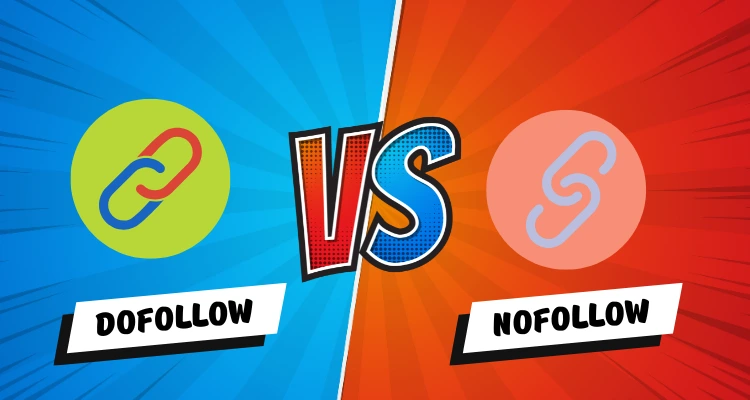
While dofollow links actively pass on link equity, nofollow links, as the name suggests, instruct search engines not to pass this equity. Nofollow links are marked with an HTML attribute rel="nofollow". Search engines still acknowledge these links, but they don't directly contribute to improving a website's ranking.
Here's a quick comparison:
| Feature | Dofollow Links | Nofollow Links |
|---|---|---|
| Link Equity | Passes link equity to the target site | Does not pass link equity |
| Use Case | Boosts rankings and authority | Used for comments, ads, or untrusted sites |
| HTML Attribute | None (default) | rel="nofollow" |
Importance of Dofollow Links
Dofollow links are a cornerstone of SEO because they:
According to Ahrefs, 91% of pages on the internet get no organic traffic, primarily due to a lack of backlinks. Dofollow links are essential for escaping this statistic and driving measurable SEO results.
Link Attributes You Should Know
In addition to dofollow and nofollow links, four key attributes are important in modern SEO for understanding and managing the purpose of backlinks:
By understanding these link types and attributes, you can make informed decisions about which links to prioritize in your SEO strategy and ensure compliance with search engine guidelines.
Acquiring high-quality dofollow backlinks can be a game-changer for businesses looking to improve their online presence. These links are powerful tools in boosting search engine rankings, increasing domain authority, and driving organic traffic.
While earning backlinks organically is ideal, purchasing them from trusted sources is often a strategic way to speed up results.
Benefits of Acquiring Premium Dofollow Backlinks
Industries That Benefit Most from Dofollow Backlinks
Certain industries see a higher return on investment when leveraging high-quality dofollow backlinks:
By purchasing backlinks strategically, businesses in these industries can rise above competitors and capture their target audience's attention effectively.
Google has a clear and strict stance against buying backlinks as part of its guidelines for webmasters. According to Google, any link meant to manipulate a website's ranking in search engine results violates its Link Scheme Policy. This includes links bought with the intent to pass PageRank or manipulate rankings.
What Does Google Say About Buying Backlinks?
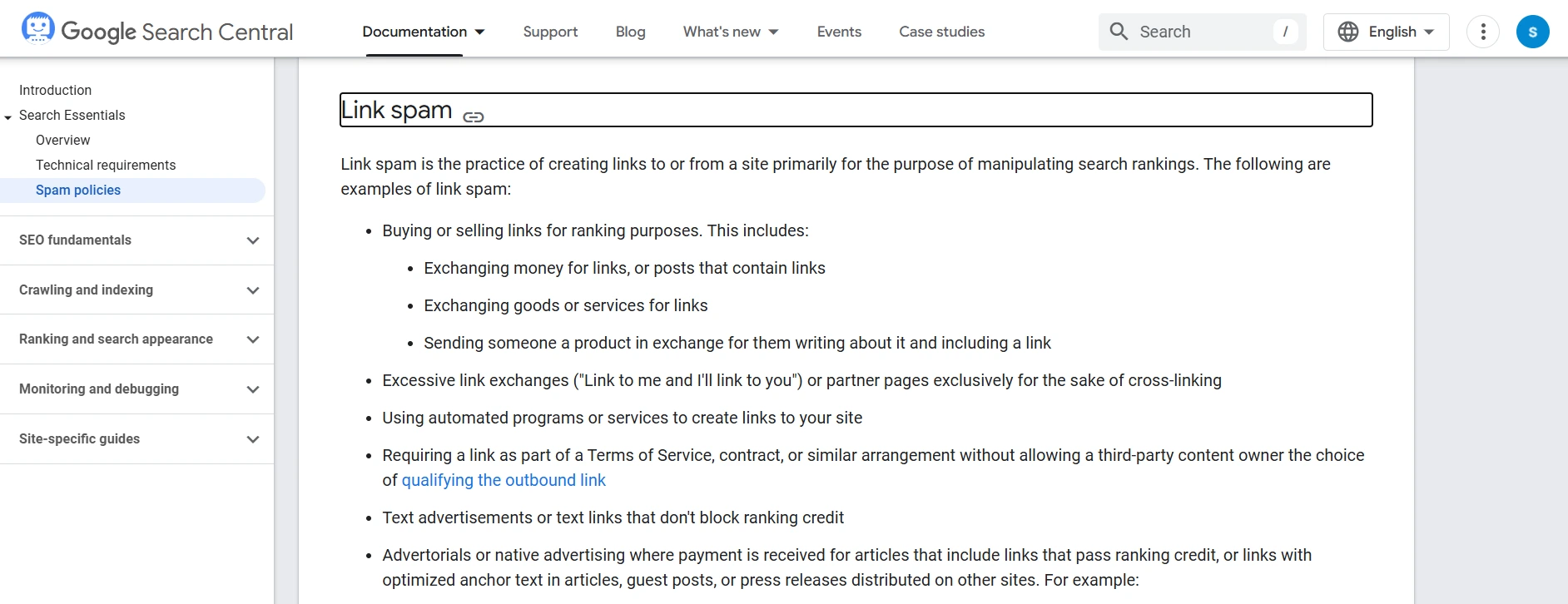
Google views purchased backlinks as an attempt to artificially boost a website's authority, which can undermine the fairness of search rankings. Specifically, Google's guidelines state:
By enforcing these rules, Google aims to maintain the integrity of its ranking algorithm, ensuring that sites earn their positions based on quality content and natural link-building efforts.
The Risks of Violating Google's Guidelines
If Google detects that your website is involved in purchasing backlinks to manipulate rankings, it may take strict action against your site, which could include:
Examples of Unsafe Practices That Trigger Penalties
Staying Safe While Acquiring Backlinks
To stay within Google's guidelines:
Understanding Google's stance on backlinks is essential to avoiding penalties and ensuring long-term SEO success. While purchasing backlinks can offer quick wins, it must be approached with caution and transparency to stay compliant with Google's rules.
Backlinks are a critical part of SEO, but not all backlinks are created equal. Understanding the different types of backlinks and their purposes can help you build a strategy that aligns with your SEO goals. Here's a breakdown:
Which Backlink Type Is Most Beneficial?
The type of backlink that is most beneficial depends on your SEO goals:
By understanding these types of backlinks and their purposes, you can craft a well-rounded strategy that enhances your site's credibility, rankings, and visibility in search engines.
Not all backlinks are beneficial for your website. To truly boost your SEO performance, you need to focus on high-quality backlinks while avoiding those that could harm your site's reputation. Here's how to evaluate backlink quality effectively:
Factors That Determine High-Quality Backlinks
How to Identify Low-Quality or Spammy Links
Importance of Natural Anchor Text Diversity
Anchor text is the clickable text in a hyperlink, and its diversity is critical for maintaining a natural backlink profile:
Checklist for Assessing Backlink Quality
By focusing on relevance, authority, and natural diversity, you can ensure your backlinks positively impact your site's SEO while avoiding penalties and maintaining long-term growth.
Finding reliable sources for dofollow backlinks is crucial to improving your SEO while staying compliant with search engine guidelines. Choosing reputable providers ensures you receive high-quality links that positively impact your rankings. Here's how to identify trusted sources and avoid scams.
Red Flags to Watch Out For When Buying Backlinks
A List of Trusted Platforms Offering High-Quality Backlinks
Here are some platforms known for providing reputable backlink services:
Why Trust RedStagLabs for Buying Your Backlinks
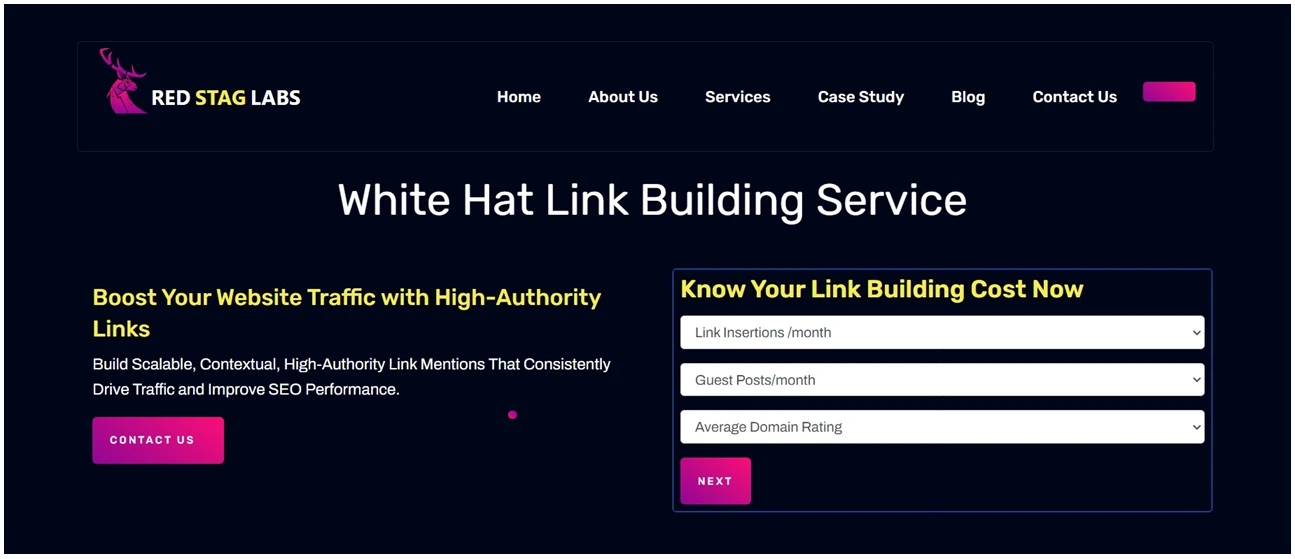
At RedStagLabs, we prioritize quality, transparency, and long-term results. When you choose us for your backlink needs, you're not just purchasing links; you're investing in a strategy tailored to elevate your website's authority and search engine rankings.
We work exclusively with high-authority, niche-relevant websites to ensure that every backlink adds genuine value to your SEO profile. Our process is fully compliant with search engine guidelines, ensuring ethical practices that protect your site from penalties.
With a proven track record, transparent communication, and customized solutions, RedStagLabs is your trusted partner in building a strong and credible online presence.
Buying backlinks can be a smart strategy for improving your website's authority and rankings, but it must be done carefully to avoid penalties and maintain credibility. Follow these best practices to ensure your backlink purchases are effective and compliant with SEO guidelines.
To avoid detection by search engines and ensure long-term benefits:
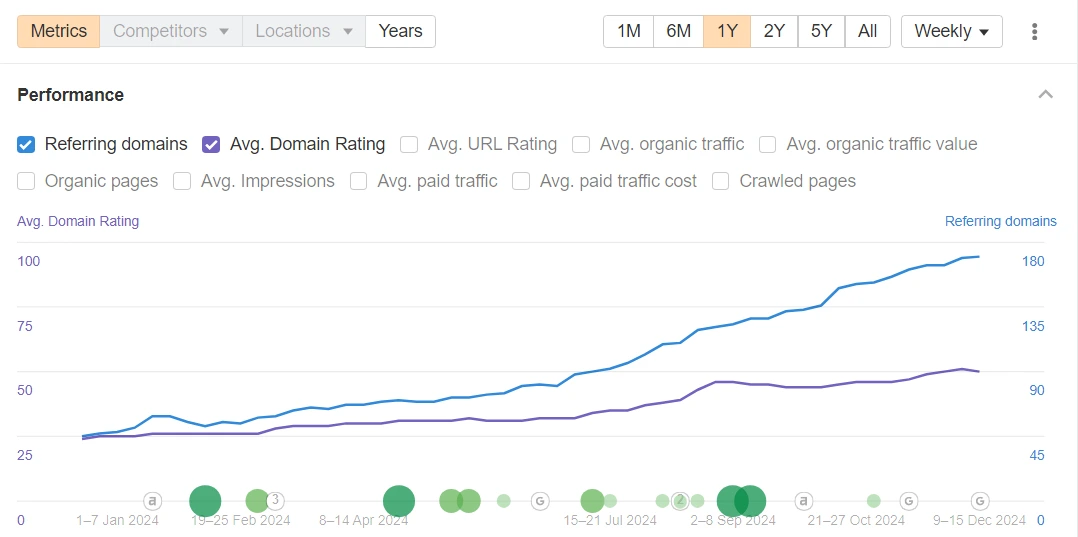
Link velocity refers to the rate at which your website acquires new backlinks. Search engines expect a steady and natural growth pattern:
For maximum impact, your purchased backlinks must support your broader SEO goals:
Backlink management doesn't end after purchase:
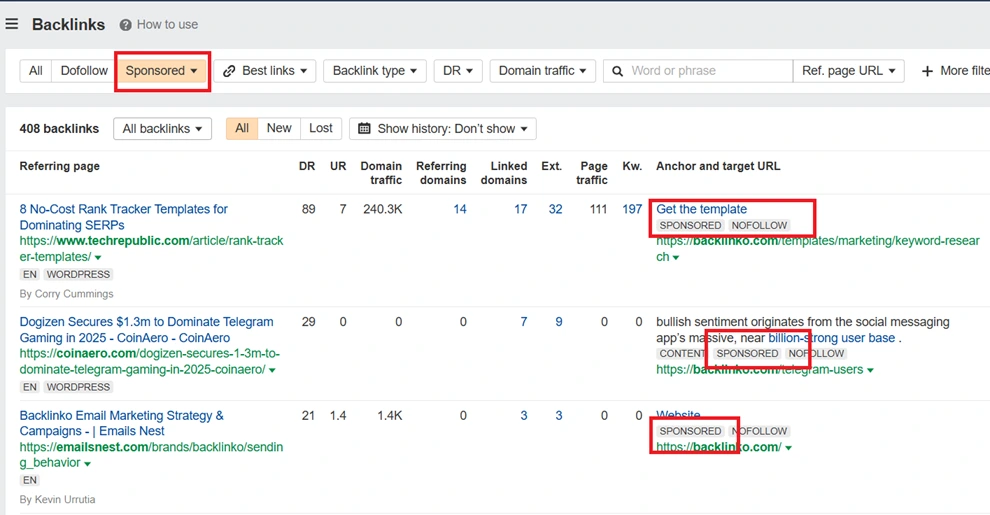
Stay compliant by:
By following these best practices, you can enhance your website's SEO performance through backlink purchases without risking penalties or compromising credibility. Remember, quality and strategy are more important than quantity when it comes to backlinks.
Buying backlinks can be a useful SEO strategy, but it comes with ethical and legal responsibilities. Businesses must balance the desire for better rankings with the need to remain transparent and compliant with search engine guidelines and industry regulations. Here's what you need to know:
Ethical Concerns in Link Buying
How to Remain Transparent
Potential Legal Implications
Balancing Ethical and Legal Considerations
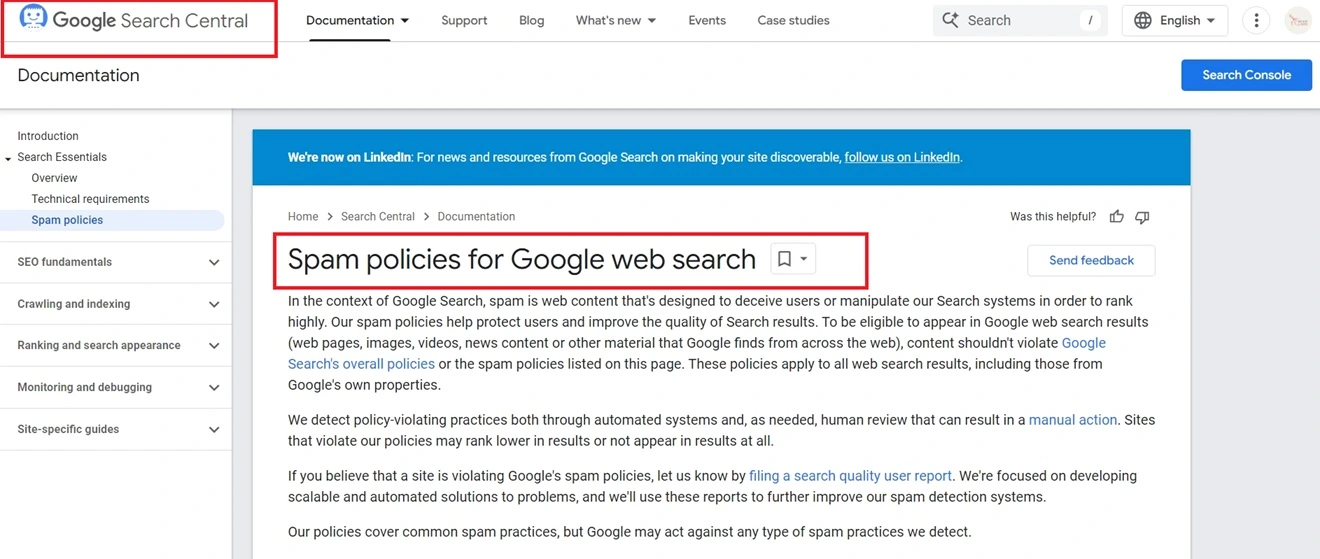
The practice of link buying has evolved significantly over the years, transitioning from questionable black-hat techniques to more transparent and ethical strategies. Understanding this history helps contextualize current best practices and highlights the importance of staying compliant with search engine guidelines.
The Early Days of Link Buying
The Turning Point: Google's Crackdown
Modern Link-Buying Practices
Lessons from the Evolution of Link Buying
While purchasing backlinks can accelerate your SEO efforts, earning backlinks organically is often the most sustainable and ethical strategy. By focusing on quality content, genuine relationships, and targeted outreach, you can build a natural backlink profile that boosts your rankings and credibility without risking penalties.
Strategies for Earning Dofollow Backlinks Organically
Tips on Content Marketing
Guest Blogging
Outreach Tips
Find broken links on high-authority websites and suggest your content as a replacement. Use tools like Ahrefs' Broken Link Checker to identify opportunities.
Identify top-ranking content in your niche, create a more comprehensive or updated version, and reach out to websites linking to the original piece.
Respond to journalist requests with expert quotes or insights, earning backlinks from reputable publications.
Send personalized emails to site owners or bloggers, pitching your content as a valuable resource worth linking to. Ensure your outreach is polite and relevant.
The Value of Organic Backlinks
Buying dofollow backlinks can be safe if done responsibly and ethically. Ensure the backlinks come from reputable and relevant websites, and always comply with search engine guidelines by using rel="sponsored" for paid links. Avoid link farms, spammy providers, and bulk purchases, as these can lead to penalties from Google.
To ensure high-quality backlinks:
The cost of high-quality dofollow backlinks can vary widely depending on the domain authority and relevance of the linking site. Generally:
Buying backlinks from unreliable providers can lead to:
Always vet providers thoroughly and prioritize quality over quantity.
A balanced backlink strategy combines purchased and organically earned links to create a natural profile.



